- Regulatory Status
- RUO
- Other Names
- TECK (Thymus-Expressed Chemokine), Small-inducible cytokine A25 (SCYA25), CKb15 (Ck beta-15)
- Ave. Rating
- Submit a Review
- Product Citations
- publications
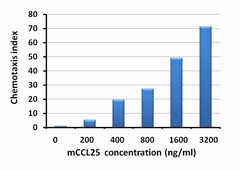
-

Baf3-hCCR9 transfectants chemoattracted by mouse CCL25.
CCL25, which signals through CCR9 receptor, is mainly expressed in the thymus and small intestine. In the thymus, CCL25 contributes to correct thymocyte maturation by promoting CD4+CD8+ thymocyte trafficking through the cortex via α4β1-dependent adhesion to VCAM-1, and also stimulates CD4+CD8- cell attachment to fibronectin in the medulla. In the small intestine, CCL25 is expressed by intestinal epithelium and controls segmental specialization of the intestinal immune system by recruiting gut-specific memory/effector T cells.
CCL25 also promotes melanoma, ovarian cancer, breast cancer, leukemia, and prostatic carcinoma cell migration. A recent report shows that multiple myeloma cells can produce CCL25 and induce mesenchymal stromal cell migration. Bone marrow pre-pro-B cells also migrate in response to CCL25. CCL25 expression can be induced in the liver of patients with primary sclerosing cholangitis. Intestinal epithelial cell expression of CCL25 is also reduced in HIV-positive individuals.
Product Details
- Source
- Mouse CCL25, amino acids Gln24-Asn144 (Accession# O35903.2) was expressed in E. coli.
- Molecular Mass
- The 121 amino acid recombinant protein has a predicted molecular mass of approximately 16 kD. The DTT-reduced and non-reduced protein migrate at approximately 16 kD by SDS-PAGE. The N-terminal amino acid is Glutamine.
- Purity
- >98%, as determined by Coomassie stained SDS-PAGE.
- Formulation
- 0.22 µm filtered protein solution is in PBS.
- Endotoxin Level
- Less than 0.01 ng per µg cytokine as determined by the LAL method.
- Concentration
- 10 and 25 µg sizes are bottled at 200 µg/mL. 100 µg size and larger sizes are lot-specific and bottled at the concentration indicated on the vial. To obtain lot-specific concentration and expiration, please enter the lot number in our Certificate of Analysis online tool.
- Storage & Handling
- Unopened vial can be stored between 2°C and 8°C for up to 2 weeks, at -20°C for up to six months, or at -70°C or colder until the expiration date. For maximum results, quick spin vial prior to opening. The protein can be aliquoted and stored at -20°C or colder. Stock solutions can also be prepared at 50 - 100 µg/mL in appropriate sterile buffer, carrier protein such as 0.2 - 1% BSA or HSA can be added when preparing the stock solution. Aliquots can be stored between 2°C and 8°C for up to one week and stored at -20°C or colder for up to 3 months. Avoid repeated freeze/thaw cycles.
- Activity
- Bioactivity was measured by its ability to chemoattract Baf3-hCCR9 cells in a dose dependent manner.
- Application
-
Bioassay
- Application Notes
-
BioLegend carrier-free recombinant proteins provided in liquid format are shipped on blue-ice. Our comparison testing data indicates that when handled and stored as recommended, the liquid format has equal or better stability and shelf-life compared to commercially available lyophilized proteins after reconstitution. Our liquid proteins are verified in-house to maintain activity after shipping on blue ice and are backed by our 100% satisfaction guarantee. If you have any concerns, contact us at tech@biolegend.com.
Antigen Details
- Structure
- CC Chemokine
- Distribution
-
CCL25 is expressed by small intestinal epithelial cells, thymic medullary dendritic cells, and cortex epithelial cells.
- Function
- CCL25 is a chemokine that is involved in T cell development in the thymus and in recruiting effector lymphocytes to small intestinal epithelium. CCL25 induces extravasation of IgA antibody-secreting cells in the small intestine.
- Interaction
- CD4 and CD8 single positive thymocytes, immature double positive thymocytes, macrophages, dendritic cells, IgA antibody-secreting cells, and cancer cells.
- Ligand/Receptor
- CCR9
- Cell Type
- B cells, Dendritic cells, Tregs
- Biology Area
- Cell Biology, Immunology, Signal Transduction
- Molecular Family
- Cytokines/Chemokines
- Antigen References
-
1. Hieshima K, et al. 2004. J. Immunol. 173:3668.
- Gene ID
- 20300 View all products for this Gene ID
- UniProt
- View information about CCL25 on UniProt.org
Related FAQs
- Why choose BioLegend recombinant proteins?
-
• Each lot of product is quality-tested for bioactivity as indicated on the data sheet.
• Greater than 95% Purity or higher, tested on every lot of product.
• 100% Satisfaction Guarantee for quality performance, stability, and consistency.
• Ready-to-use liquid format saves time and reduces challenges associated with reconstitution.
• Bulk and customization available. Contact us.
• Learn more about our Recombinant Proteins. - How does the activity of your recombinant proteins compare to competitors?
-
We quality control each and every lot of recombinant protein. Not only do we check its bioactivity, but we also compare it against other commercially available recombinant proteins. We make sure each recombinant protein’s activity is at least as good as or better than the competition’s. In order to provide you with the best possible product, we ensure that our testing process is rigorous and thorough. If you’re curious and eager to make the switch to BioLegend recombinants, contact your sales representative today!
- What is the specific activity or ED50 of my recombinant protein?
-
The specific activity range of the protein is indicated on the product datasheets. Because the exact activity values on a per unit basis can largely fluctuate depending on a number of factors, including the nature of the assay, cell density, age of cells/passage number, culture media used, and end user technique, the specific activity is best defined as a range and we guarantee the specific activity of all our lots will be within the range indicated on the datasheet. Please note this only applies to recombinants labeled for use in bioassays. ELISA standard recombinant proteins are not recommended for bioassay usage as they are not tested for these applications.
- Have your recombinants been tested for stability?
-
Our testing shows that the recombinant proteins are able to withstand room temperature for a week without losing activity. In addition the recombinant proteins were also found to withstand four cycles of freeze and thaw without losing activity.
- Does specific activity of a recombinant protein vary between lots?
-
Specific activity will vary for each lot and for the type of experiment that is done to validate it, but all passed lots will have activity within the established ED50 range for the product and we guarantee that our products will have lot-to-lot consistency. Please conduct an experiment-specific validation to find the optimal ED50 for your system.
- How do you convert activity as an ED50 in ng/ml to a specific activity in Units/mg?
-
Use formula Specific activity (Units/mg) = 10^6/ ED50 (ng/mL)
 Login / Register
Login / Register 







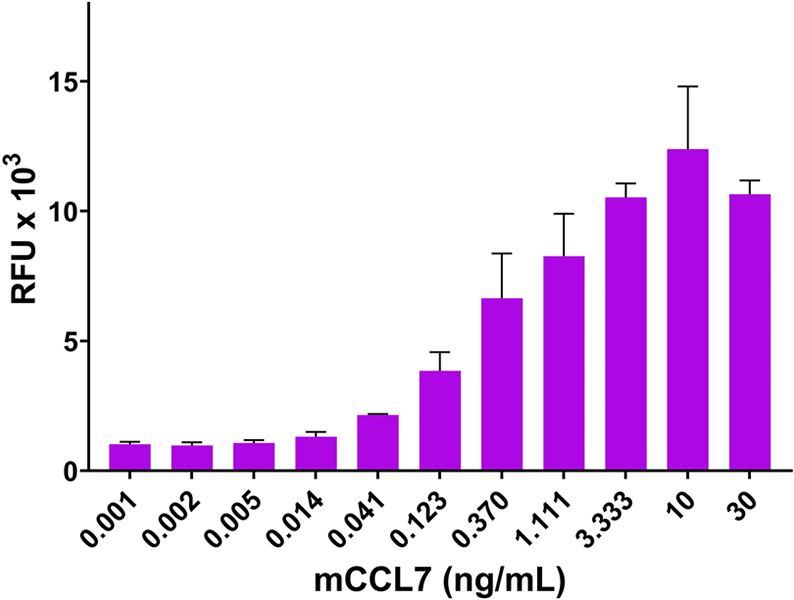
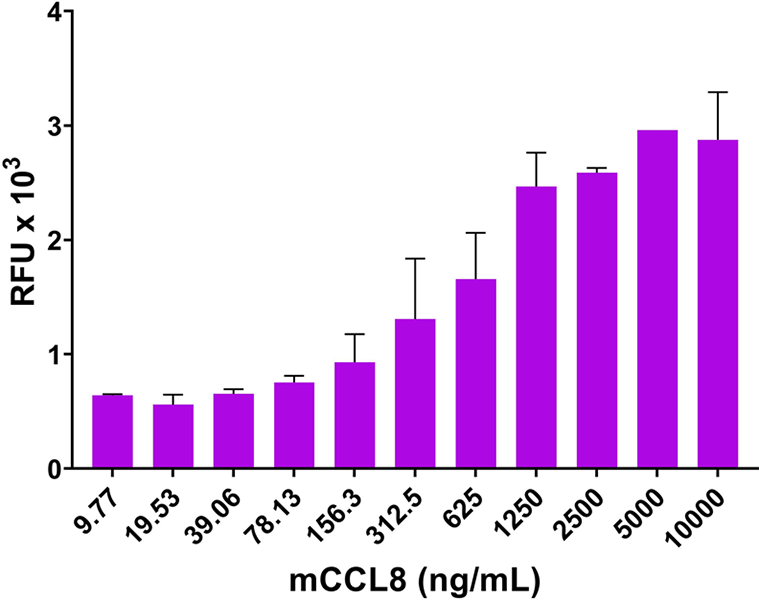
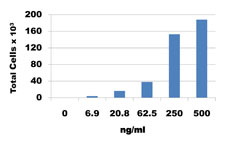
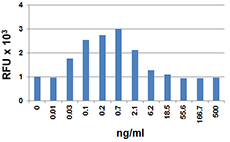



Follow Us